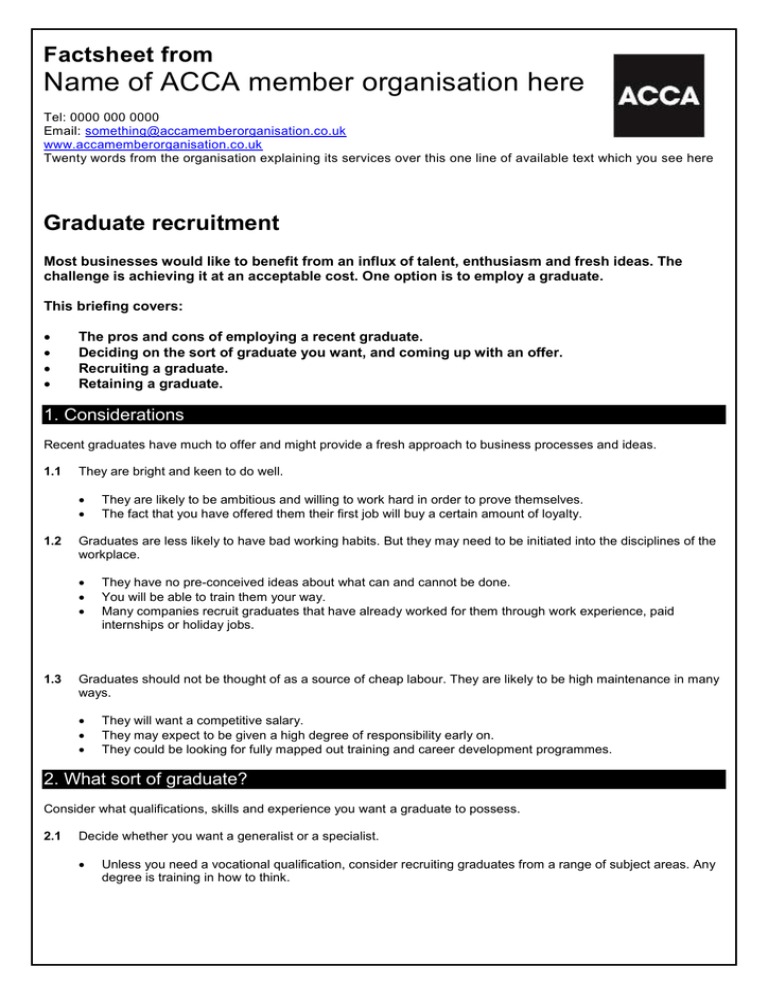
Factsheet from
Name of ACCA member organisation here
Tel: 0000 000 0000
Email: something@accamemberorganisation.co.uk
www.accamemberorganisation.co.uk
Twenty words from the organisation explaining its services over this one line of available text which you see here
Graduate recruitment
Most businesses would like to benefit from an influx of talent, enthusiasm and fresh ideas. The
challenge is achieving it at an acceptable cost. One option is to employ a graduate.
This briefing covers:
The pros and cons of employing a recent graduate.
Deciding on the sort of graduate you want, and coming up with an offer.
Recruiting a graduate.
Retaining a graduate.
1. Considerations
Recent graduates have much to offer and might provide a fresh approach to business processes and ideas.
1.1
They are bright and keen to do well.
1.2
Graduates are less likely to have bad working habits. But they may need to be initiated into the disciplines of the
workplace.
1.3
They are likely to be ambitious and willing to work hard in order to prove themselves.
The fact that you have offered them their first job will buy a certain amount of loyalty.
They have no pre-conceived ideas about what can and cannot be done.
You will be able to train them your way.
Many companies recruit graduates that have already worked for them through work experience, paid
internships or holiday jobs.
Graduates should not be thought of as a source of cheap labour. They are likely to be high maintenance in many
ways.
They will want a competitive salary.
They may expect to be given a high degree of responsibility early on.
They could be looking for fully mapped out training and career development programmes.
2. What sort of graduate?
Consider what qualifications, skills and experience you want a graduate to possess.
2.1
Decide whether you want a generalist or a specialist.
Unless you need a vocational qualification, consider recruiting graduates from a range of subject areas. Any
degree is training in how to think.
2.2
Decide whether you want specific skills, such as languages or advanced computing programming skills.
2.3
Most university courses include continuous assessment, so most students will have a good idea of their
eventual grades by the time they start applying for jobs.
If such skills are important, include them in the ‘person specification’ at the start of the recruiting process.
If commercial awareness is important, that should also be included in the ‘person specification’.
Some graduates take work placement experience and internships as part of their degree.
Others will have worked in industry, services or commerce, on a part-time basis or during holidays, to help
finance their education.
Some students take a gap year and complete voluntary work.
3. Coming up with an offer
The graduate job market is the strongest it has been for many years. Although growing numbers of graduates are
choosing to join small businesses, you will have to compete with other smaller firms, as well as large graduate
recruiters, to attract good graduates.
Aim to come up with a set of benefits which will make the job appealing.
3.1
Be clear about what you have to offer. Work out both a ‘job specification’ and a ‘person specification’ before you
start.
Decide who the graduate will be working for, and what they will be doing.
Think about the sort of training and career opportunities you will be able to provide.
You do not have to have a ‘graduate programme’ as most graduates are looking for a job first and a career
second.
Offer a competitive salary. Benchmark your graduate salaries by contacting the Chartered Institute of
Personnel and Development (020 8612 6200 or www.cipd.co.uk).
Average graduate salaries typically start at £26k but can be higher or lower depending on the sector and location
of the business.
3.2
Do not oversell the job. Be realistic about what you can offer.
Discrimination on the basis of age is illegal.
Remember, as a small business, your main selling points are related to the excitement of working in a small team
and having an influence on the business’ success.
You can offer the graduate the prospect of becoming a key team worker.
Working directly with the directors is also a potentially exciting prospect.
Future career prospects, training opportunities, the location, the commute and its associated costs will all affect
how desirable the position on offer is.
Describe your offer in terms of a flying start to a career that steadily progresses. If you can, give information
about the organisation of your business, or a business plan.
3.3
Working for a smaller business offers the chance to experience how the different aspects of a business work —
an unlikely prospect within a large company.
A smaller business can give a graduate the chance of real responsibility in several different roles early on.
There may be the chance to get involved in exciting new projects.
4. Targetting universities
2
There are numerous universities and higher education institutions in the UK. Focus your efforts, to avoid wasting time
and money.
4.1
Target the university or institution of choice.
4.2
If you want specialist degrees, go to the UCAS website (www.ucas.ac.uk) and research the degree courses
to identify relevant institutions.
Do not base your choice on unresearched beliefs, such as your own experience. They may be out of date.
Make yourself known to the careers service at your chosen universities or institutions. Get your name
entered onto their databases, so that your details are circulated to potential recruits.
Do not ignore your local universities. Get to know the careers advisers and tutors if you can.
You may find students who have settled in the area and would like to stay there.
5. Meeting candidates
Careers fairs, the milk round and employer presentations are good ways to make contact with prospective graduate
employees. But these can be time consuming and costly.
5.1
Careers fairs offer you the chance to meet future graduates in an informal setting.
The cost of exhibition space varies, from nothing to several hundred pounds.
Make sure you have enough people to answer enquiries, and plenty of information about your company.
Get your timing right. Most graduate careers fairs take place between November and March and again in the
summer term. You should book your place early.
There are different types of fair.
Many universities offer SME days (for small and medium-sized enterprises). You will be able to meet students
without having to compete with the large graduate recruiters.
5.2
The milk round offers employers the opportunity to interview candidates on campus.
5.3
Interview as many students as you can who meet your job requirements.
Aim to come away with a shortlist of candidates to invite for further interviews and possibly some ‘taster’
work experience or internships before you make a final decision.
Most universities also organise employer presentations.
Do not rely on your company name to attract students. Be specific about what you can offer graduates.
6. Recruitment agencies
There are a number of specialist graduate recruitment companies who vary in the services they offer. Some offer a CV
bureau, others offer fully interviewed graduates and others offer training for graduates as part of the package.
6.1
Charges range from 15 to 25% of the first year’s salary, depending on the company you use and the level of
service required.
6.2
They offer a range of services, including identifying relevant universities and courses, advertising and initial
screening and selection.
To find an agency, look in newspapers and online to see which recruitment firms are advertising for graduates.
Alternatively:
Ask the Association of Graduate Recruiters (020 7033 2460 or www.agr.org.uk).
If you shortlisted target universities or institutions, ask their careers services which agencies specialise in
recruiting from the various disciplines there.
Ask business friends which agencies they have used.
3
7. Advertising for candidates
Another way to find a graduate is to advertise.
7.1
Advertising on site at the universities is usually very cheap.
7.2
University careers services offer a range of services, including notice boards and career vacancy bulletins.
Prospects Today is the main graduate directory (0161 277 5200 or www.prospects.ac.uk). It is available online
and on campus.
The directory is published annually in September.The Prospects Today website receives over two million
visits a month. You can advertise from a little as £300.
Your advert will be emailed to relevant graduate job seekers and promoted via online social media networks.
They can also tailor a bespoke recruitment campaign for you.
7.3
Advertising on graduate-specific recruitment websites is often less expensive than traditional print
advertising. Visit www.milkround.com, www.targetjobs.co.uk and www.graduate-jobs.com for more
information.
7.4
National newspapers carry regular ‘graduate appointment’ features.
Your industry trade magazine may carry graduate recruitment advertisements.
8. Typical difficulties
While the recruitment process will be similar to that for other employees, there can be some specific problems
associated with the graduate recruitment.
8.1
You may leave it too late to attract high quality candidates from this year’s graduates.
Start planning your recruitment campaign early in the academic year.
By the time the exam results are announced, many of the best graduates will already have accepted job offers.
8.2
You may invest time interviewing candidates who then take jobs elsewhere.
8.3
Be realistic about the calibre of graduate you can expect to attract with your offer.
You may be flooded with applications, especially if you use online job boards.
Devise a filtering process to get numbers down to a manageable level.
For example, be specific about the skills and qualifications required for the job.
9. Retaining a graduate
Once you have a graduate on board, it is important to keep them motivated and satisfied, to ensure that the effort
invested in the recruitment process does not go to waste.
9.1
Offer a mentor — an experienced colleague who will guide the graduate and organise an appropriate
training schedule.
9.2
Give feedback. Remember that graduates have come from an intense learning environment, where
everything has been measured and evaluated.
Give regular performance appraisals and providepraise for good work.
4
9.3
Increase the graduate’s salary after, say, six months, subject to achieving agreed targets.
9.4
Give responsibility as early as you can.
Make sure this responsibility is delegated deliberately, not simply by default.
Ask the graduate to set up new projects, but be sure to monitor their progress.
However confident and well qualified they are, graduates still need support and feedback.
9.5
Ensure you keep the promises you make.
Give careful consideration to the rest of your employees. Resist giving the graduate a grand job title or
obvious preferential treatment. Minimise any potential resentment by explaining the graduate’s role to the
rest of your team.
Offering work experience or internships
Many university and and college courses require undergraduates, particularly those on vocational courses, to complete
work experience, usually for the whole of their penultimate year of study. Many students pick up a ‘taste’ for specific
jobs or sectors whilst at university.
A.
There are significant advantages to offering placements.
B.
There are also substantial advantages for the undergraduates.
C.
Undergraduates often inject enthusiasm into your team.
They want wide experience, and are often willing to move to different departments and try different tasks.
The cost to the business is relatively low.
It is not uncommon for the placement to be so successful that you end up recruiting the undergraduate
permanently.
It provides some much-needed income.
It greatly increases the chances of obtaining a job on graduation.
Contact your local university careers service for students who want experience or internships.
Use your usual recruitment process to find the most suitable candidate.
Undergraduates who have benefited from the experience will usually be happy to introduce you to other
potential candidates when the placement comes to an end.
Experts’ quotes
“The recruitment process can be the same as for other employees, but you need to look for potential rather than a track
record.”
Paula Grayson,
Chartered Institute of Personnel and Development Recruitment Forum
Expert contributors
Thanks to Liz Trumper (management consultant, 020 8647 5424); Simon Reichwald (Bright Futures, 01242 236 415).
Last reviewed 01.10.14
© Atom Content Marketing 2014. ISSN 1369-1996. All rights reserved. No part of this publication may be reproduced or transmitted without the
written permission of the publisher. This publication is for general guidance only. The publisher, expert contributors and distributor disclaim all liability
for any errors or omissions. Consult your local business support organisation or your professional adviser for help and advice.
5



